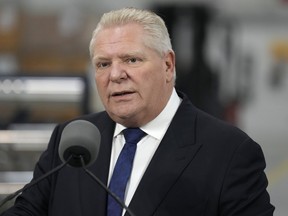Watch: National Post’s Chris Selley and National Post contributor Anthony Furey discuss the latest in the 2025 Ontario election
Article content
National Post’s Chris Selley and National Post contributor Anthony Furey discuss the latest in the 2025 Ontario election. Watch the video or read the transcript.
Article content
Article content
Chris Selley: Hi there, I’m Chris Selley, National Post columnist. I’m here with Anthony Furey, and it’s a fun day, I think, always in an election campaign when advance polls open, and we don’t have a costed platform from any of the three major parties. The Greens have one, the Conservatives, Liberals and the NDP do not. And it strikes me as especially odd in an election like this where huge amounts of money are flying around. Doug Ford, this week, said he wants to spend up to $60 billion on his tunnel under the 401. And I just feel like we should have at least some back-of-a-napkin calculations here to make sure that A, the parties have actually thought about how much money they have and B, so that we have something to hold them to account to. What do you think Anthony?
Advertisement 2
Article content
Anthony Furey: No, it’s an excellent point. This is a campaign that’s very much about broad strokes, feelings of leadership and the ebb and flow of where Ontario is right now. The idea of running an election based on who is the best position to respond to the Trump tariffs, Doug Ford’s original proposition is not going to be one that’s based on the policy nuances of the province itself. So, I think that’s in part why we have not seen these detailed discussions costing out of issues and the breaking down of the details. I’m in support of more infrastructure everywhere, as soon as possible. We clearly need it. And I don’t dismiss these tunnels the way other people do. I think, hey, it’s an interesting forward-looking idea. By all means, do the study. Let’s see where it goes. But at the same time, to your point, we do want some more details on this sort of stuff. And yet people are at the polls, seemingly happy to vote without them.
Selley: Yeah, I mean the tunnel itself, it’s a fascinating thing to me because it’s — I mean the idea seems to come out of nowhere and $60 billion, I mean I don’t understand how anyone could come up with a figure that’s even half way accurate for something like that. I too am interested to see the study just, because frankly I’m enormously skeptical unlike you, I think. But yeah, by all means, let’s study it. It’s just the amounts of money that we seem to be talking about. You’re right, we need infrastructure, we need to improve healthcare, we need to improve housing. All that money is there but you know time was people used to talk about balancing budgets, and at some point, surely we’re gonna have to get back there.
Article content
Advertisement 3
Article content
Furey: One would think, but we don’t really have fiscal conservatism anywhere in Canada right now. From our major conservative leaders, they’re just not the issues that they’re pushing. I think for a variety of reasons. And that just isn’t the rallying cry that it used to be, even for the conservative base. They’re more focused on other issues right now, cultural issues. And I think in many cases they should be, but people are not minding the till as much as they used to. Whether it’s the idea of, the budget will balance itself from Justin Trudeau. And let’s not forget that the original rationale he made behind that was I’m going to grow the economy so much that it’s going to make any deficit irrelevant. Donald Trump actually said that during his first term as well. He said, well, I’m going to run, you know, 5 per cent growth. so who cares about how much deficit spending I do? And that almost became vogue about 10 years ago. And I think we’re still dealing with the after effects of that.
Selley: Do you think, I mean, it’s funny to think about the times when the NDP would promise a balanced budget. I mean, what do think it is that changes that demand among the electorate for a balanced budget?
Advertisement 4
Article content
Furey: Well, if you follow the old maxim that politics is downstream from culture, culturally, we are addicted to debt more than ever in terms of a life spent focused on consumer goods and buy now, pay later. So I think it’s just kind of where we’re at right now. And the idea of sort of deficit financing or debt financing all your purchases in life is something that’s quite common.
Selley: So wonder where does that leave Ford? He’s going to have a four-year mandate unless something spectacular happens between now and next week. I mean, do you think he’ll be held to account for all this spending? Or does he have a four-year mandate that he says that he wants to basically just run up as much money on the credit card as he wants?
Furey: Well, he’ll have a four-year mandate to focus on the economy, to focus on jobs, growth, infrastructure, and opportunity, which is a very business-friendly mandate, but that doesn’t necessarily equal a fiscally conservative mandate when we talk about businesses who fund everything through debt, and so forth. So no, I don’t think he will have a mandate to be fiscally conservative, and he doesn’t seem to be seeking one, either.
Selley: Well, maybe someday. I think we’ll leave it there. Thanks everyone for listening.
Article content






